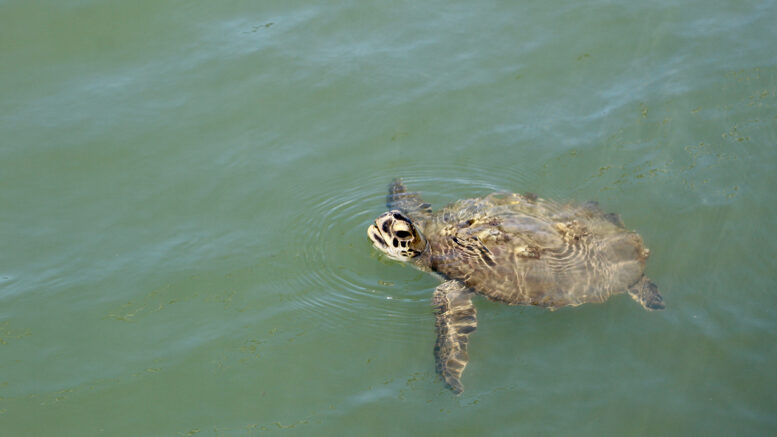By Zoe Sherman
Sea turtle populations in St. Augustine are on the decline, according to recent studies, but the bigger concern is why?
Some say over-development of land is slowly destroying Florida’s wildlife and their habitats. Although the process is providing housing and business opportunities for St. Augustine, it might also be damaging our ecosystem.
Dr. Ed McGinley, a professor in Flagler College’s Natural Sciences department, has been conducting research on Sea Turtles while teaching.
“I started in June of 2020 during the pandemic. This project of walking a marina and looking for turtles was started by a student in my capstone several years before that,” McGinley said.
Since the start of his research, McGinley has been able to identify 400 unique turtles at 3 different local marinas.
He discussed the local damage that sea wall construction can have on sea turtles specifically.
“As we develop more land, more nutrients are drained into the water from things like lawn fertilizer, pesticides, herbicides, etc. The construction of sea walls leads to beach erosion and removal of sea turtle nests,” McGinley said.
McGinley also said increasing tourism rates has a connection to environmental health, but it’s not all bad.
“100% there is (an impact), and that is a mixture of both positive and negative things. As more people visit and see the cool things they read about, dolphins, sea turtles, manatees, etc. they are more likely to care for and support conservation efforts,” McGinley said.
He explained the downside to the connection as well.
“However, if the infrastructure is not in place, the extra people can have a decidedly negative effect. More trash, more human waste, more cars, etc. which can negatively impact the environment. If more people want to come here, do we just keep bulldozing green spaces to put more houses and apartments?” McGinley said.
Heather Krumholtz, communications manager at the Whitney Laboratory for Marine Bioscience, said it’s vital to protect sea turtles.
“Studying wild animals with long life spans, such as sea turtles, can also provide valuable insights not only into the turtles themselves, but also into other species including humans,” Krumholtz said.
The laboratory works tirelessly to provide a safe and healthy environment for wounded turtles.
“The Sea Turtle Hospital opened in October 2015 to provide rehabilitation, education and research for sea turtle conservation in Northeast Florida. The hospital rehabilitates sick and injured sea turtles, and, once healthy and cleared by the veterinarian, releases them back to their habitat,” Krumholtz said.
The laboratory conducts research along with caring for infected sea turtles.
“Research is an important component of the Sea Turtle Hospital at Whitney Lab. We work closely with Whitney Lab scientists, and engage with scientists in various fields to better understand a wide range of factors that impact sea turtle health conservation,” Krumholtz said.
The laboratory accepts interns from both Flagler College and the University of Florida. Krumholtz shared how their teachings and information can benefit our wildlife’s habitats.
“Don’t trash where you splash. This one is especially important. Please keep all trash and other debris out of our oceans. Always carry out what you carry in, especially trash, sand toys, and broken beach umbrellas and chairs,” Krumhotlz said.
Cleaning up our community needs to be a priority to everyone, as there are nearly 50 billion pieces of litter along U.S. roadways and waterways, according to Keep America Beautiful.
Krumholtz also shared more tips on how we as citizens can better our city.
“Never approach a sea turtle emerging from or returning to the ocean. Our females are exhausted and have traveled thousands of miles to return home to nest. Our hatchlings also have a long swim which could be 30, 50, or 80 and more miles off shore after hatching,” Krumholtz said.
Sea turtle populations and all marine creatures need our help. It’s time we do better for those who cannot ask for help.
Sunrise at Vilano Beach. By Zoe Sherman



Be the first to comment on "Sea Turtle Populations in Danger in St. Augustine"